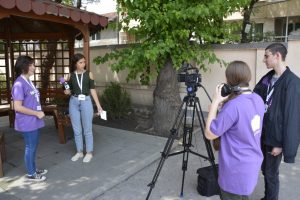Coming from different backgrounds and experiences makes the whole atmosphere all the more interesting.
In school, kids have likely been in the same class for years and know what to expect both socially and educationally from their day to day life.
But at the summer school, their boundaries are pushed, and they have to work out how to adapt.
Learning at the summer school is student-led and project based. Each participant is given a role to complete in order to contribute to the course’s final media production.
They may find that some of their peers are more skilled than them and they will need to ask for help. Sometimes they have to share their skill base and help others to learn.
A student from Israel was very shy and lacking confidence in the beginning, but during the summer school made social connections which actually drove her to achieve more in her classes.
There are skills to be gained through teamwork with international peers.
The students regularly spoke about the value of working with international peers to make their final project. By the end they were most proud that they had achieved their goals – as a team.
The progress over time is amazing for a teacher to observe. The students give and receive ongoing feedback, seek each other out to collaborate and support each other, learn from each other and teach each other.
A student from Russia who was tasked with editing the live broadcast each day initially struggled with this role. Through the support of her peers she gradually improved and by the end of the summer school, lots of the students sought her out to compliment her on the advancement of her skills and she was particularly proud of this.
The Digital Skills Academy teaches about the power of praise and the value of peer-to-peer learning.
As a school teacher, it’s a privilege to see how a summer school like this one can bring students together and provide such invaluable skills in communication, collaboration and resilience. I look forward to replicating this learning in my own teaching and look forward to the next Digital Skills Academy.
Ayla Estreich is a maths teacher from the UK and was a staff member at the 2019 World ORT Digital Skills Academy. Ayla also works as a program coordinator for Action for Education, an NGO providing education for young people and women who are refugees and asylum seekers in Greece.
